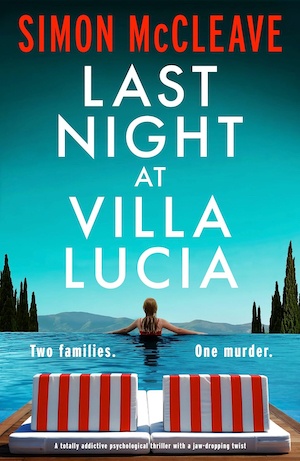
What could be more appealing than a murder mystery set in an elegant villa high on a hill overlooking the Tuscan countryside? Prolific crime novelist Simon McCleave’s Last Night at Villa Lucia feels like a vacation from the first page, as the villa’s English owner takes in her magnificent view.
A few flies in the ointment – or in this case, vodka – soon appear. The middle-aged woman who owns Villa Lucia has a significant drinking problem, once controlled with the help of Alcoholics Anonymous, but now seriously relapsed. This and the death that follows are all foreshadowed in an unnecessary prologue, which takes place well into the story. Chapter One rewinds to two days earlier with the arrival of a new set of guests – the overbearing, deeply entitled Harry Collard; his mousy wife, Zoe; and their handsome 19-year-old son, Charlie.
When the family arrives at the villa, they find their hostess, Cerys, and her luscious daughter Lowri, about Charlie’s age. One plot point boldly forecasts itself from the moment Harry meets Lowri. Most of the year, Lowri lives in London with her domineering, overprotective father. He and Cerys divorced, in part because she unsuccessfully dealt with the aftermath of a vicious rape and in part because of his abuse.
So. At least until the police arrive, you have two couples (one dad absent, but very ‘present’ in the minds of his ex-wife and daughter). Two young adults. And, rounding out the cast, the two people who keep the place humming – Lucia De Nardi, the maid, who grew up in the villa before her uncle lost possession of it, a sore point for sure, and her husband, Lorenzo, who has a sketchy past and takes care of the pool and the gardens.
You see some of the Englishmen’s arrogant behaviour, in real time and in flashback, but much of your impression of them comes from what the women say about them and how they react to them. As a result, this story might fail the Bechdel test – which checks whether a book or movie ‘features at least two female characters who have a conversation about something other than a man.’ (Thanks, Wikipedia.) Granted, Cerys and Zoe do occasionally mix it up and talk about fashion or food.
You know from the prologue that someone ends up in the infinity pool, and they aren’t swimming. By the time that death occurs, about two days into the Collards’ stay, you probably have a favoured candidate for drowning. Suffice to say, the victim’s odious behaviour has given every member of the household a potential motive.
McCleave effectively conveys the enervating heat, the villa’s isolation and the effects of too much alcohol, so that the arrival of the sober Policia di Stato’s Detective Franco Saachi is something of a relief. Naturally, the villa’s occupants don’t tell him everything and struggle to coordinate their stories, especially after Saachi reveals the initial finding this is a murder. As always, this obfuscating slows and muddles the investigation.
Cerys’s overbearing ex-husband Nick can’t stay away. He says he needs to fly out from London to make sure Lowri is all right (she is), but you may suspect he can’t resist the opportunity to undermine Cerys in the midst of the current crisis. Perhaps he also secretly hopes she’s drinking again (and she most definitely is).
In a postscript, McCleave tells readers what his intentions for this book were: exploring toxic masculinity, alcoholism and abusive relationships. I believe he achieved his goal, with a few caveats. Making both husbands so very toxic doesn’t give the narrative much nuance. It was good to see Cerys and Zoe open up to each other, and good for them, too. I appreciated how alcohol was uppermost in Cerys’s mind in most situations. She was never far from having a drink or thinking about a drink or regretting having one. More likely, four or five. Although her preoccupation became a bit redundant, it was probably an accurate way to portray this particular addiction. McCleave does give his characters some grace at the book’s end, as a reward – to you and them – for suffering through their travails.
Also see the collection Murder Under the Sun, edited by Cecily Gayford, or the books in our summertime recommendation, Holidays from Hell.
Storm Publishing
Print, Kindle
£2.99
CFL Rating: 3 Stars









